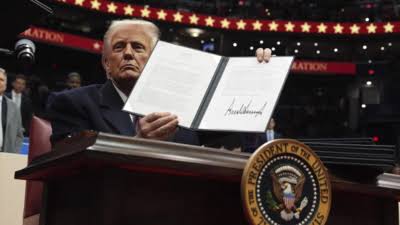Donald Trump, on his first day back as president, withdrew the US from the Paris Climate Agreement. This decision aligns the country with Iran, Libya, and Yemen as the only nations outside the global accord. The move comes after repeated criticisms by Trump, labeling the agreement as “unfair” and a “rip-off.”
Trump Withdraws US from Paris Climate Agreement for Second Time
This marks the second time Trump has pulled the US out of the agreement, first exiting in 2017 during his initial term. President Biden rejoined the accord in 2021, emphasizing the US commitment to international climate goals. However, Trump’s latest withdrawal risks undermining global efforts to curb greenhouse gas emissions.
The Paris Agreement, signed by 196 countries in 2015, aims to limit global warming to below 1.5°C above pre-industrial levels. Exceeding this limit could lead to irreversible damage to Earth’s climate systems. Trump has claimed that the accord disproportionately burdens US industries while giving leeway to major polluters like China.
Trump also signed an executive order halting leasing and permitting for wind energy projects. His administration has openly opposed renewable energy, particularly offshore wind. Trump reiterated his commitment to “drill, baby, drill,” vowing to expand oil and gas production.
During his inaugural address, Trump declared a “national energy emergency.” He promised to reverse Biden-era environmental regulations and open more areas to oil and gas exploration. The US, already the world’s largest oil producer, is expected to ramp up production further under Trump’s policies.
Environmental advocates and scientists have raised alarms over this move. The withdrawal comes after 2024, the hottest year on record, with global temperatures exceeding 1.5°C above pre-industrial levels. Experts warn that failing to cut emissions could push global warming beyond 2°C, triggering catastrophic climate impacts.
Over 5,000 US state and local leaders have pledged to uphold the Paris Agreement’s goals. These leaders represent 63% of the US population and 74% of its GDP. Public opinion also reflects opposition to Trump’s climate policies. A recent poll showed that only two in ten Americans support withdrawing from the Paris accord.
Trump’s decision could isolate the US in global climate negotiations. Critics argue that this move weakens America’s leverage in shaping international energy policies. Laurence Tubiana, an architect of the Paris Agreement, said the accord remains resilient but warned of potential setbacks.
China, the largest global emitter, continues to expand its renewable energy efforts while also producing significant emissions. Trump’s focus on fossil fuels contrasts sharply with the global shift toward cleaner energy solutions.
Trump’s withdrawal from the Paris Climate Agreement marks a controversial start to his second term. While his policies aim to bolster the fossil fuel industry, they raise serious concerns about the future of global climate efforts. The decision could have lasting impacts on both the environment and America’s role in international diplomacy.
Related Stories:
















